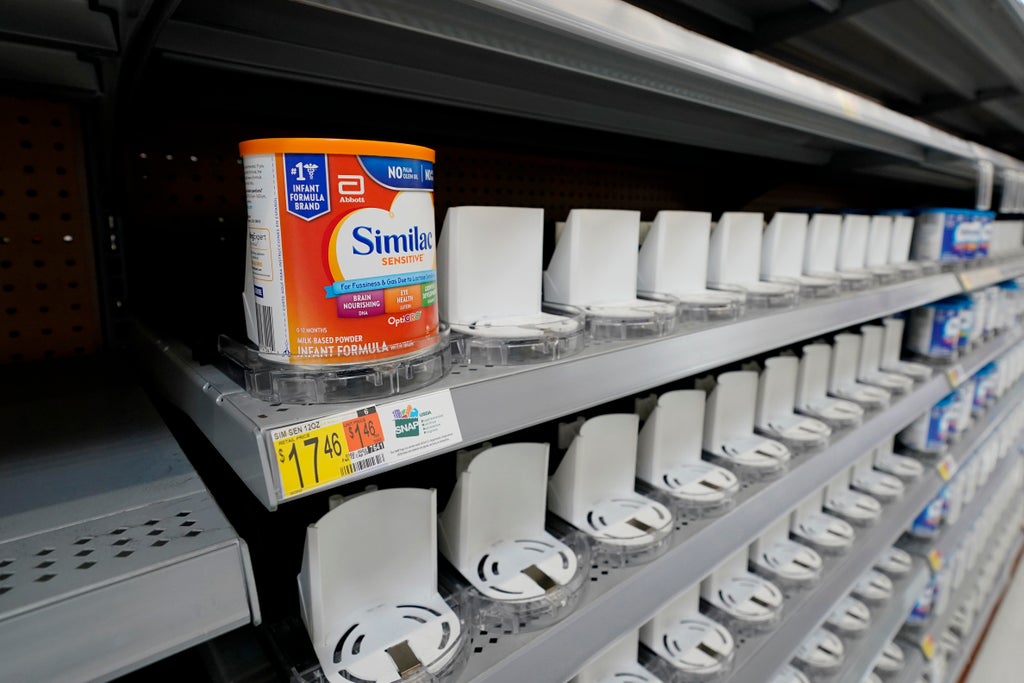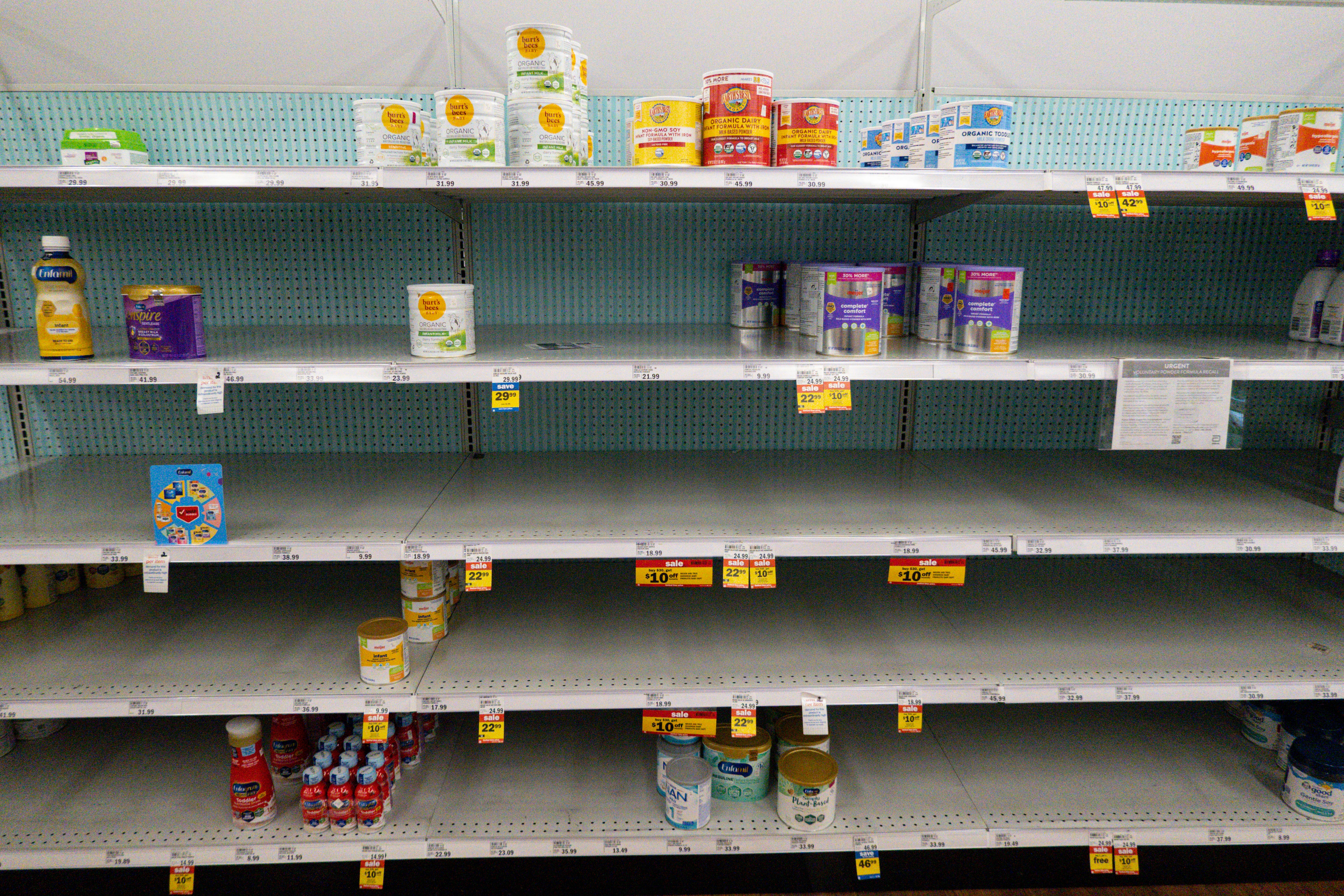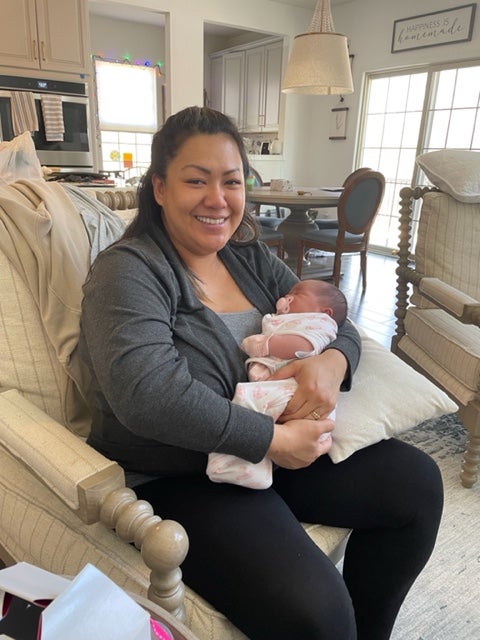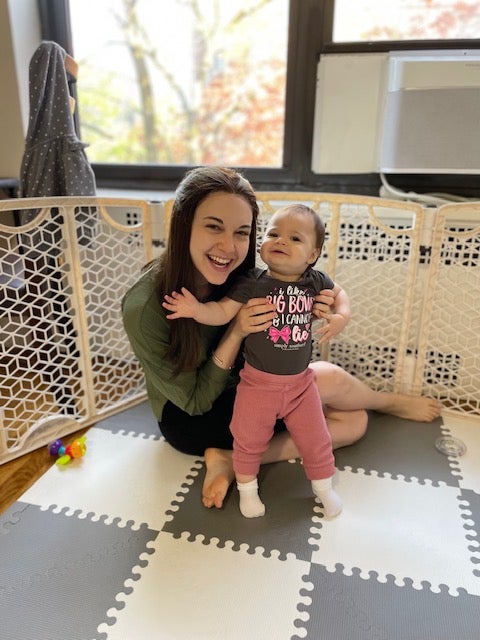
They come to the nondescript building in Hyannis, Massachusetts, facing situations that run “the whole gamut”: Grandparents raising their children’s children, immigrants, workers at the care homes, resorts and restaurants that form the lifeblood of a community kept afloat mostly by tourists and retirees.
All of them are low-income, and all of them are working their hardest to provide the basic necessities for their families on Cape Cod and the Islands: Diapers, wipes and, most importantly, baby formula.
And now too many of them are leaving without it.
“What we see in their faces is deep concern and distress,” Robin Hayward, director of A Baby Center, tells The Independent. “So this is adding another layer ... of guilt for a parent, when you can’t provide the basic needs for our babies.”
She says the charitable organisation, under the umbrella of the Council of Churches of Cape Cod, is having “a severely difficult time finding formula.
“Our shelves are just so sparse,” she says. “There’s none of the basic formula that we use constantly. The Enfamil Blue and Similac Yellow for newborns, I have been trying all week to get those formulas ... I got a grant to be able to purchase formula [but] there are none.
“There are none in the big box stores, and that’s how you have to purchase it. Shelves are empty, and if you do find the formula, they limit you to either two or four cans.”

Like A Baby Center, food pantries and charitable organisations across the country – serving low-income and struggling families – have been drastically affected by the nationwide shortage of baby formula. It’s been a growing problem for months as a result of supply chain disruption and inflation, but the situation has been exacerbated by the February voluntary recall of Abbott Nutrition’s popular powdered baby formula products due to contamination concerns.
The White House addressed the problem on Monday as press secretary Jenn Psaki said the Food and Drug Administration was “working around the clock to address any possible shortages”. The FDA has said it’s working with manufacturers to increase output and allow more importants.
For now, however, healthcare providers are urging frantic parents to contact their doctors or food pantries – but, according to Ms Hayward, even aid groups can’t obtain the amounts of formula needed, particularly as many places ration purchases.
“That wouldn’t even touch the need that I have” she tells The Independent. “Four cans would be gone in four clients. We see about 38, 40 clients a day, four days a week.”
She says the situation is “worse” than at the beginning of the pandemic, when people across the country were panic-buying necessities.
“During Covid, there was still formula,” she says. “There weren’t diapers, because a lot of manufacturers were moving into making masks or making hand sanitiser, cleaning products, things like that. But formula wasn’t touched.
“Right now, we don’t seem to have a connection to anything. Like, why is it missing?”
People are calling constantly, looking for formula and travelling from much further afield, even coming from the mainland to the Cape Cod peninsula, she says.
“We have to say no and it’s heartbreaking, because we have the means to supply formula, but we can’t for these families ... we can’t get ahold of it,” she tells The Independent. “I belong to a programme called the National Diaper Bank network that encompasses almost all the states across the nation. We have a forum page and we discuss things like this all the time: Where are you getting your formula? We had some folks saying they had friends and family” looking for cans in other states and sending them to desperate families.
For those who have a network and that option, that’s often what’s been happening. It’s been affecting the rich, the poor, the middle class, mothers of newborns and those with slightly older babies, parents with special needs children. The shortage does not discriminate.

Phi Nguyen, an assistant dean at a Pennsylvania university, gave birth to her second child, a daughter named Violet, just eight weeks ago. An older mother at 40 years old, she says most of her friends aren’t new moms and she wasn’t aware of the formula shortage when she decided she needed to stop breast feeding.
“Just for mental health reasons, because I have to get back on my meds – and just for my own health – I was like, ‘I cannot do the breast feeding or the pumping anymore. I need to switch to formula,’” Ms Nguyen tells The Independent. “Then, lo and behold, I had no idea [about] this shortage – and here I was breastfeeding.”
She’d heard from friends who had babies early in the pandemic, so she’d previously purchased a few supplies just to be safe. When she recently went to look for more, however, the problem became immediately apparent.
“I went to probably four pharmacies freaking out, and they did not have what I wanted and needed, because I was looking for a specific brand,” she says, pointing to another problem – babies may have sensitivities or aversions to various formulas, making it nearly impossible to switch them to a different type.
And that’s their only source of nutrition.
Ms Nguyen finally heard that Costco had received a formula shipment but she didn’t have a membership card; because of that and limitations, she enlisted “four or five different family members to go and get it for me”.
Now she believes she has enough formula to feed Violet for seven weeks, or five weeks at the minimum if the newborn eats more and faster.
“Then it might be five weeks, but by then, what I’m hearing is that companies are making more, they just can’t meet the demand,” she says. “I’m hopeful that, if I just kind of keep checking each week, just picking up a can here or there, there might be a new batch.”
It’s that thread of hope for an uptick in supply that is being clung to by parents across the country – particularly those with younger babies.
Ruthie Schreiber, a physician assistant in Queens, New York, has been thankful that her nine-and-a-half-month-old, Kira, is nearly ready to switch fully to food after struggling to find formula.

“She’s at the later end; if she was like a month or two, I’d be freaking out,” first-time mother Ms Schreiber, 26, tells The Independent.
Still, she’s been panicking to find Kira enough formula to last until she can completely make the diet switch.
“I was literally at work yesterday just calling each CVS near me, [asking] ‘It says you guys have this in stock; Do you actually have it in stock?’” she says. “And most of them were like, ‘No. I just checked the shelves.’”
Ms Schreiber called her mother in a different town, who was able to get her hands on “a couple”, then reached out to her pediatrician, who luckily had a few samples that she thinks will get Kira over the line.
“Now I feel a little bit calmer,” she says.
But the desperate scramble – and the terrifying possibility of being unable to feed your baby – is a devastating added post-partum stress, she says.
“There was a split-second where I was like, if we don’t get formula, what are we going to do?” she says. Her husband “half-joked” that she could try breast-feeding, which she’s never done.
“What is the alternative?” Ms Schreiber says. “I’m a very type-A, organised type of person. I’m very into having a backup plan, Plan B – what happens if something goes wrong. In this case, it was very unclear. There is no backup.”
Kira’s formula, she says, is “all she knows her entire life”.
She adds: “You wouldn’t think, in 2022, there would be food shortages of such proportion,” she tells The Independent. “Every single brand and every single type of formula is just unavailable across the entire country, people driving to different states just to be let down.”
As always, when demand outstrips supply, opportunists are taking advantage. Parents with means are reportedly paying up to $120 for a single can of formula.
The situation, however, is also bringing out the altruistic side of society, parents say. Online forums, particularly, are facilitating swaps and sharing as parents exchange formula types that may be accepted by one baby and rejected by another. Mothers whose babies have outgrown formula are offering it, often for free, to other parents.
“Moms in the FB communities have really joined forces and help each other find formula,” Ms Nguyne wrote via text after her initial interview. “So thankful for the community. Lots of people have the samples and don’t need them and others are helping search and letting each other known where they can find certain brands in real time.”
Social media and online forums can be constitute a double-edged sword, though. At A Baby Center in Massachusetts, “we keep a very active Facebook page”, Ms Hayward tells The Independent.
“Today I was really struck because someone posted a recipe from 1967 for homemade formula, which is so out of date, so lacking nutrition” and not in accordance with current “guidelines for health ... I was just so horrified.”
It prompted her to contact one of the formula companies directly, she says, but she has yet to hear back.
In the meantime, she’s “just trying to find a way to buy in gross” for the diaper and formula bank.
“Now that we can’t find it, it’s such a desperate situation when you see a new mom come up to the window with a brand new baby,” Ms Hayward tells The Independent. “They absolutely look defeated and have that blank look on their face, like, ‘What am I going to do?’
“There needs to be some type of formula revival,” the religious nonprofit director says, punctuating the statement with a bittersweet laugh.







